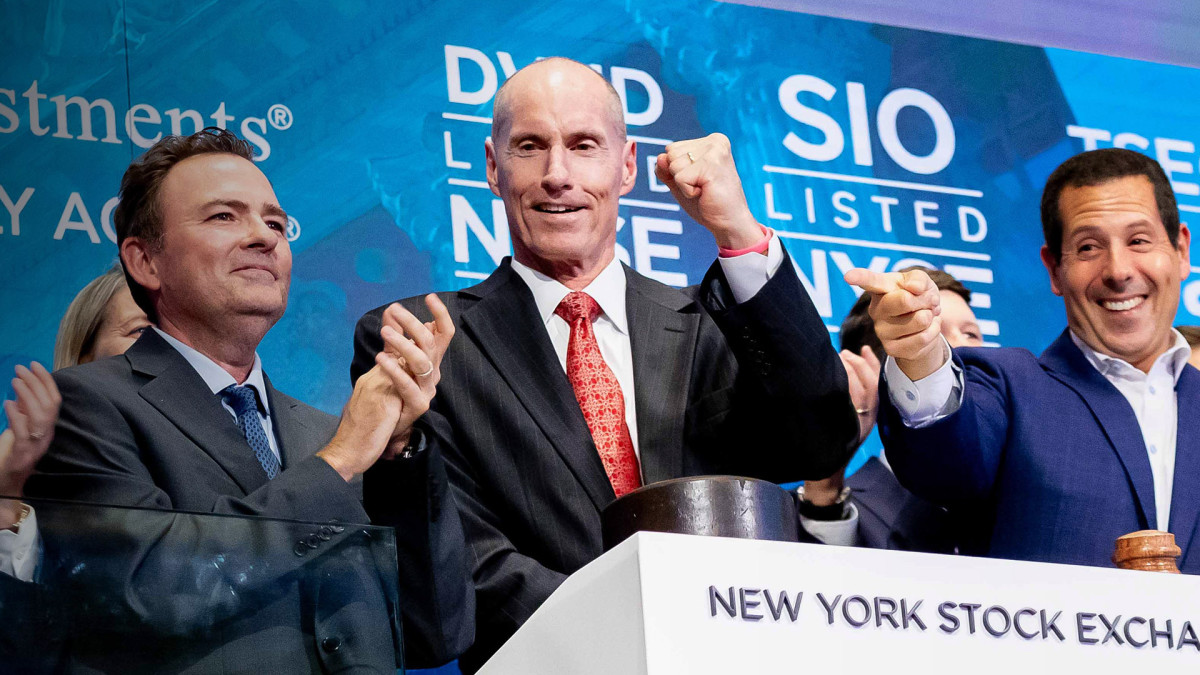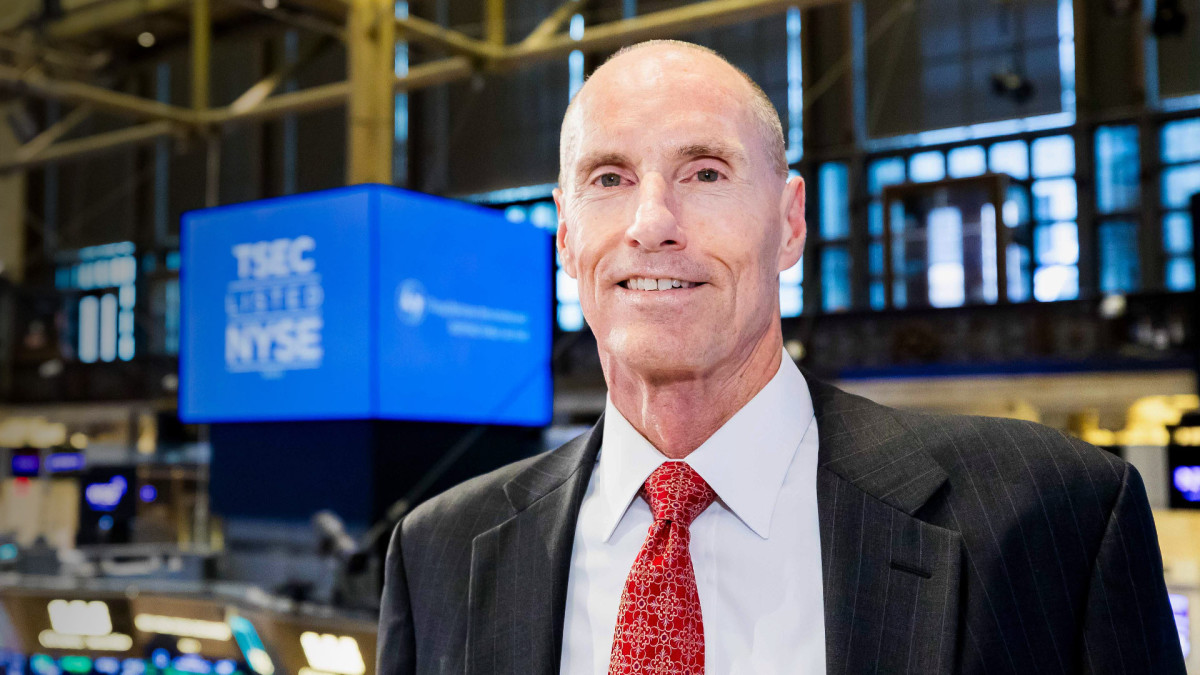
Blake Moore had what you might consider an accidental six-year career in the National Football League.
Unlike most athletes who make it to that level, he did not devote his childhood and teenage years to positioning himself to be a professional athlete.
"Absolutely not. I didn't even start thinking about possibly playing in the NFL until my, geez, I guess junior, senior year in college, I went to a little Division 3 school, no scholarship, played for fun, and it was fun," Moore told TheStreet in an interview. "I had no aspirations; I just wanted to get a really good education and figure out what I was going to do with my life."
Related: Dollar General has a plan to cut retail theft (you won’t like it)
Moore, who now serves as CEO of Touchstone Investments, may not have spent his high school and college years targeting a pro career, but he had one anyway. He spent six seasons in the NFL as an offensive lineman with the Cincinnati Bengals and Green Bay Packers, earning himself a trip to the Super Bowl in Cincinnati during his second season.
For Moore, however, football was always a detour and never the destination.
"Even when I started training camp at the Bengals, I was all set up to go to law school out of college and get my law degree and either pursue a law career or business career with a law background," he added.
Touchstone Investments describes itself as "a Distinctively Active investment company with steadfast dedication to active management that offers a diverse, focused selection of mutual funds and ETFs across asset classes and strategies, with access to institutional asset managers who act in a subadvisory capacity."
Moore, who is 65, joined Touchstone in 2020. The Cincinnati-based firm manages more than $25 billion in assets. His resume also includes senior positions at, among other firms, UBS Global Asset Management and Allianz Global Investors Fund Management.

Image source: Touchstone Investments
The NFL was not about the money in those days
The NFL was, of course, not nearly as lucrative in the early 1980s as it is today. Moore understood that football was not his ticket to financial freedom.
"My signing bonus was $2,500, and I made the rookie minimum that year of 25 grand," he said. "I will assure you that as I was playing football, I was realizing to myself and to my wife and then eventually family, boy, there better be something bigger at the other end of this because I'm not going to make it very long on just the football money."
In those days few players made enough money to set themselves up for life. The NFL legend Paul Brown made that clear in a speech he gave to rookies.
"You need to understand that football is not an end of itself. It's a means to an end. So you know, take this, use it, do something valuable with it after football, and use it that way," Moore recalled.
"In the offseasons I clerked at a law firm," he adds. "For a while I did other things, but mostly clerking for law firms just to see what I liked to do from a law standpoint because I knew eventually I was gonna go on and get my law degree. That was my plan after football."
Moore ultimately graduated from Harvard Law School before he fully transitioned to the business world.
(This transcript has been edited for brevity.)
TheStreet: Did you find that the discipline of being an athlete helped you in law school?
Moore: The discipline and the rigor and the experience of being in a high-pressure competitive situation week in and week out in the NFL absolutely prepared me for just about anything else I wanted to do in life. ... [When] you do what we do in the NFL on every Sunday, and not just Sunday, ... every practice is analyzed, almost every play, and [you] have to perform in that kind of situation. Law school: Yeah, not a problem.
TheStreet: So did that also help you transition into the working world, where you're just not going to have the same level of nerves as, you know, your 25-year-old colleague who graduated and doesn't have that life experience?
Moore: [Absolutely,] there's something to that. That's not to say I don't get nervous or tense or stressed out over different situations. But having been through what I've been through, I know how to handle it, and tend to react in a different way than people who have never been in high-stress situations before.
TheStreet: Tell me about your career as a lawyer and what led you to leave it. And take me through how you made your way to where you are now?
Moore: As I was going through law school, I always felt I wanted to be more on the business side of things, just generally speaking. So I took more business-oriented courses in law school.
When I graduated my first decision was a family decision: Where do we want to raise the family for the next 15 years to get the kids through high school, etc.? And we chose San Diego, which turned out to be a great place to raise a family, [and] I worked at a law firm on the business side.
San Diego is not a financial hub, but we certainly had business deals and transactions. So [I'm] more of a business lawyer, not a litigator. My dad had been a litigator all his life, and I did not have any interest in doing that. And then [I] got into this business, literally on a fortuitous, almost serendipitous, cold call from a recruiter who was looking to fill a general counsel position at an asset-management firm.
I took the call and said, "Look, I don't know a lot of specific things about that business, but I feel like I'm a good attorney. I can learn fast, and I'd love to talk more about it." And I talked my way into that job back in 1993.
And so my first few years in the business were born in a legal capacity as a general counsel for Nicholas Applegate out in San Diego. Then eventually I stopped being a lawyer, as I like to say, and took on leadership roles in different areas of the business and eventually running businesses.
TheStreet: What drew you to the nonlawyer side of things, to the asset management piece of it?
Moore: I tell you ... just being in, working in, a business and in a leadership position in a business brought back all kinds of — I'll relate it back to football, just working in a team environment, having a common goal, figuring out how you're going to achieve that goal, whether it's business growth, new business opportunities, acquisitions, whatever it might be. And getting everybody going in the same direction and achieving a goal. It was just — I loved it.
Blake Moore: Don't settle for average
TheStreet: Is there anything you learn from any of your coaches that you apply to business?
Moore: It's probably a conglomeration; it's the thing I really took away from the NFL, and I tell this to people all the time. I refer to it as the "law of average." For important things in life, if you settle for average you're eventually going to fail or not be doing it much longer.
And that was so true in the NFL. Every single year you had to get better and improve and be better, ... be bigger, be stronger, be faster, because otherwise you would become average and be out of the league.
[That] also translated into your record, too. If you as a football team are average, if you're average for more than a year or two, guess what? Players are going to be gone; coaches are gone. It's such a highly competitive environment that when I left the NFL, one of the things I missed the most about it was just how competitive it was and how it demanded the best out of every single person on the field.
And one of the reasons I love the business I'm in today is that it's very similar. If all you're going to do is produce average results, you're not going to prosper, you're just one of 100, you're not one of the best. And this business demands better-than-average results and performance day in and day out.
TheStreet: How do you get that out of your employees?
Moore: Well, [I'm a] big, big fan of leading by example and holding myself to a very high standard, I think that's probably the most important thing: Lead from the front. And then as part of a team, coaching, helping them understand why things are important and what they need to do to succeed.
And then also, just from a team standpoint, making sure everybody's in the right spot, and have a lot of good people and make sure they're in the right spots. You [can't] have 12 quarterbacks; [that] doesn't work very well.
And then making sure they have what they need to succeed, whether it's resources, or my having their back, or making sure they have the people around them so that they can succeed. It's all those things.
TheStreet: As a clearly hard worker, how do you set the balance?
Moore: [Again,] that's one of the things that I like about this business. People understand that you don't just kind of put in your eight hours and mediocre your way through the day. ... It attracts high achievers, bright, competitive people. ...
When we interview and recruit and talk to people, we're looking for those self-starters [with a] high energy level, people that are gonna go out there and make it happen. And because of the nature of this business, those kinds of people tend to be attracted here. ...
I don't work 12 hours a day. I work whenever I need to, and I do whatever I need to to make sure things are getting done. My family is my first priority; always has been. But I think you can balance that.
I've been fortunate to have a very strong life partner for over 40 years. My wife, Cindy, has been fabulous. So I set an example there, too. I tell people: You got to prioritize your family because you can't give everything you have at work. If you're not, you don't have everything squared away on the home front.
TheStreet What have you learned from your kids that you've applied to business?
Moore: Well, that is a good question. What have I learned from my kids? Yeah. So the first thing that comes to mind, and it absolutely applies to business, is don't expect them to be like me. Don't expect them to react or handle every situation the way I do. And don't expect them to like or achieve or succeed at the same things I do. And that's so true at work, too. Right?
I have to understand that we're gonna be successful at work as a team, and in the things we're trying to do, if I surround myself with a lot of people who aren't just like me and don't react the same way and have different opinions and different viewpoints.







